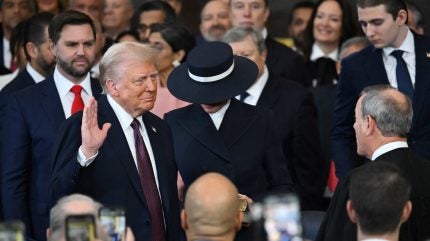
President Donald Trump has signed an executive order for the US to leave the World Health Organization (WHO).
As one of his first acts as the 47th President of the US after his inauguration on 20 January, Trump signed the order to retrigger the US’s departure from WHO. He originally tried to remove the country from the organisation in 2020, but withdrawal requires one year of notice. When Biden took office six months later, he quickly revoked Trump’s action.

Discover B2B Marketing That Performs
Combine business intelligence and editorial excellence to reach engaged professionals across 36 leading media platforms.
The order states the US was withdrawing “due to the organisation’s mishandling of the Covid-19 pandemic that arose out of Wuhan, China, and other global health crises, its failure to adopt urgently needed reforms, and its inability to demonstrate independence from the inappropriate political influence of WHO member states”.
The executive order added that the US has made “unfairly onerous payments” to the WHO. The country is the organisation’s biggest financial backer, contributing around 18% of its funding.
In response to the order, the WHO said it “regrets the announcement that the US intends to withdraw from the organization”.
A statement added: “WHO plays a crucial role in protecting the health and security of the world’s people, including Americans, by addressing the root causes of disease, building stronger health systems, and detecting, preventing, and responding to health emergencies, including disease outbreaks, often in dangerous places where others cannot go.

US Tariffs are shifting - will you react or anticipate?
Don’t let policy changes catch you off guard. Stay proactive with real-time data and expert analysis.
By GlobalData“The US was a founding member of WHO in 1948 and has participated in shaping and governing WHO’s work ever since, alongside 193 other member states, including through its active participation in the World Health Assembly and Executive Board. For over seven decades, WHO and the US have saved countless lives and protected Americans and all people from health threats. Together, we ended smallpox, and together we have brought polio to the brink of eradication. American institutions have contributed to and benefited from membership in WHO.
“With the participation of the US and other Member States, WHO has over the past seven years implemented the largest set of reforms in its history, to transform our accountability, cost-effectiveness, and impact in countries. This work continues.
“We hope the US will reconsider and we look forward to engaging in constructive dialogue to maintain the partnership between the US and WHO, for the benefit of the health and well-being of millions of people around the globe.”
It is unclear at this stage who would fill the funding gap following the US withdrawal. The Bill Gates Foundation is the WHO’s second biggest donor, but most of its funding goes to polio eradication. Other major donors include the global vaccine group Gavi, the European Commission and the World Bank. The next-largest national donor is Germany, which contributes around 3% of the WHO’s funding.
Concerns raised
The renewed order to leave the WHO has sparked concern amongst the healthcare industry globally.
Kavelle Christie, a health policy and advocacy expert and director of the Gender Equity & Health Justice Program at Community Catalyst, has concerns about some of the potential decisions discussed by the President taking office.
“Weakening ties with WHO or undermining global pandemic preparedness could leave the world more vulnerable to emerging health threats—especially if anti-science rhetoric or isolationist policies overshadow established global collaborations,” said Christie.
“Trump has also threatened to reimpose broader restrictions on international health programmes. This includes the expanded Global Gag Rule, which cut funding to foreign organisations providing or even discussing abortion services, drastically limiting access to critical family planning and reproductive care worldwide.”
In his inauguration speech, Trump shed some light on healthcare in the US, saying his administration is going to tackle chronic diseases and work to improve the health of children.
“We will end the chronic disease epidemic and keep our children safe, healthy and disease-free,” he said.
Other healthcare policies ‘face uncertainty’
Healthcare experts have also shared other concerns about some potential changes under the Trump administration, one being a potential change in funding or running of the president’s Emergency Plan for AIDS Relief (PEPFAR).
Christie added: “PEPFAR could also face renewed uncertainty. Any disruptions to PEPFAR funding or collaboration with global agencies can hamper the fight against HIV/AIDS in low-income countries.”
Launched by President Bush in 2003, the US has poured more than $100bn into PEPFAR. During his previous term, however, Trump reinstated and expanded a policy that prohibits US funding to foreign organisations that perform or promote abortion. There are concerns that this policy by Trump could impact PEPFAR as a 2023 report from conservative think tank The Heritage Foundation accused Biden’s administration of using PEPFAR to promote “sexual and reproductive health rights” and “reproductive health services”, which the report said were “code for abortion”, sparking concerns this could be something Trump’s administration may want to change.
In the campaign lead-up to the November election, Trump was relatively quiet about his intentions on the US healthcare space but was vocal that he wanted to bring Robert F Kennedy Jr in to lead the US Department of Health & Human Services. Due to RFK Jr’s stance as an anti-vaxxer, this has ignited concern in the healthcare space.




